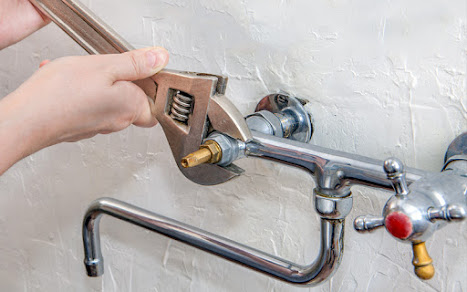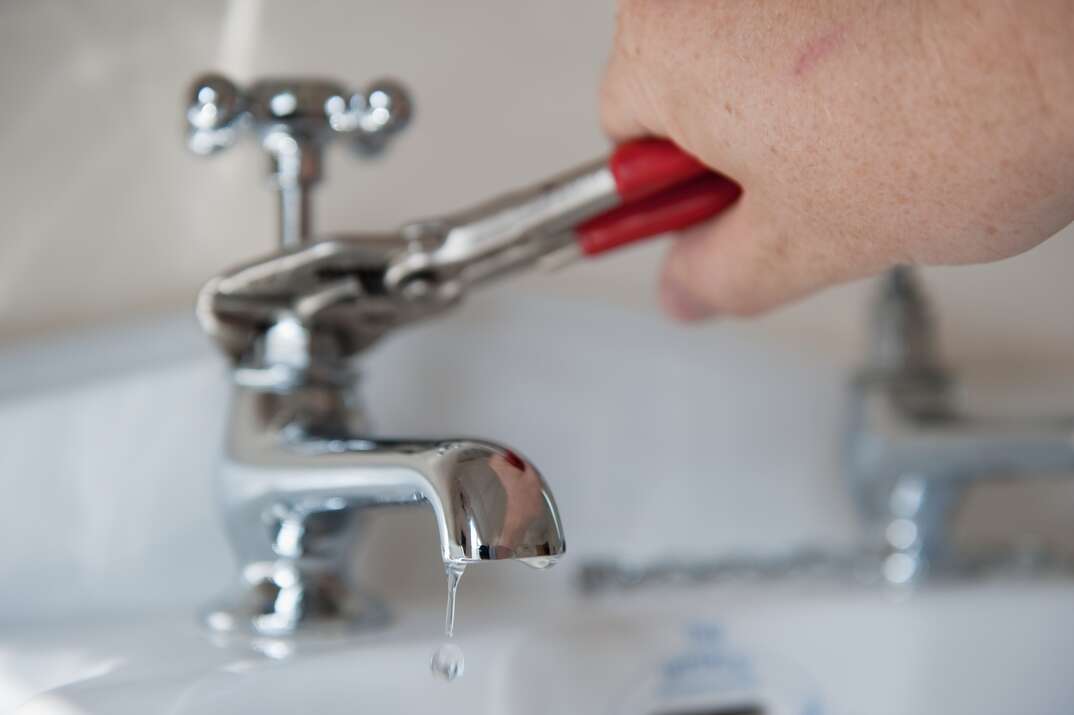Detect & Take Care Of Plumbing Noises
Detect & Take Care Of Plumbing Noises
Blog Article
We have encountered the article relating to Why Do My Plumbing Pipes Make A Knocking Noise below on the web and think it made sense to share it with you here.

To detect loud plumbing, it is essential to identify very first whether the undesirable sounds occur on the system's inlet side-in other words, when water is transformed on-or on the drainpipe side. Noises on the inlet side have varied causes: extreme water stress, used shutoff and faucet parts, improperly connected pumps or other appliances, inaccurately positioned pipeline bolts, as well as plumbing runs consisting of a lot of limited bends or other restrictions. Sounds on the drain side usually stem from bad place or, just like some inlet side sound, a format having limited bends.
Hissing
Hissing sound that takes place when a faucet is opened slightly generally signals too much water stress. Consult your neighborhood public utility if you believe this trouble; it will certainly have the ability to inform you the water stress in your location as well as can set up a pressurereducing shutoff on the incoming water system pipe if needed.
Other Inlet Side Noises
Creaking, squeaking, scratching, snapping, and tapping usually are triggered by the growth or contraction of pipes, generally copper ones supplying warm water. The audios take place as the pipelines slide against loose fasteners or strike nearby house framing. You can often pinpoint the area of the trouble if the pipelines are subjected; just follow the audio when the pipelines are making noise. Most likely you will certainly find a loose pipe hanger or an area where pipes exist so close to flooring joists or other framing items that they clatter against them. Affixing foam pipe insulation around the pipes at the point of get in touch with ought to treat the trouble. Make certain bands and hangers are secure as well as provide appropriate support. Where feasible, pipe fasteners must be attached to substantial structural components such as foundation wall surfaces instead of to mounting; doing so lessens the transmission of resonances from plumbing to surface areas that can amplify as well as transfer them. If connecting bolts to framing is inevitable, cover pipes with insulation or various other resilient product where they speak to fasteners, and also sandwich the ends of new bolts between rubber washers when mounting them.
Fixing plumbing runs that experience flow-restricting limited or various bends is a last resource that ought to be embarked on just after seeking advice from an experienced plumbing professional. However, this situation is relatively usual in older houses that may not have actually been constructed with indoor plumbing or that have seen numerous remodels, specifically by beginners.
Chattering or Shrieking
Extreme chattering or shrilling that occurs when a valve or faucet is switched on, which usually disappears when the fitting is opened totally, signals loose or defective interior components. The remedy is to change the valve or faucet with a new one.
Pumps as well as home appliances such as cleaning makers and also dish washers can transfer motor noise to pipes if they are incorrectly linked. Connect such products to plumbing with plastic or rubber hoses-never stiff pipe-to isolate them.
Drain Sound
On the drain side of plumbing, the principal objectives are to remove surfaces that can be struck by falling or rushing water and also to shield pipes to include inevitable audios.
In brand-new building and construction, bathtubs, shower stalls, toilets, as well as wallmounted sinks as well as containers need to be set on or versus resilient underlayments to decrease the transmission of noise with them. Water-saving commodes and also taps are much less noisy than traditional designs; mount them as opposed to older kinds even if codes in your location still allow using older fixtures.
Drains that do not run up and down to the basement or that branch into horizontal pipe runs supported at floor joists or other framing existing specifically frustrating noise issues. Such pipes are huge enough to radiate considerable resonance; they likewise carry significant quantities of water, that makes the circumstance worse. In brand-new building and construction, define cast-iron soil pipes (the huge pipelines that drain toilets) if you can manage them. Their enormity consists of much of the noise made by water travelling through them. Additionally, prevent routing drains in wall surfaces shown bedrooms and also spaces where individuals collect. Walls containing drains must be soundproofed as was explained earlier, using dual panels of sound-insulating fiber board as well as wallboard. Pipes themselves can be wrapped with unique fiberglass insulation created the function; such pipes have an impervious plastic skin (in some cases including lead). Outcomes are not constantly satisfying.
Thudding
Thudding noise, often accompanied by shivering pipelines, when a faucet or appliance shutoff is shut off is a condition called water hammer. The sound as well as vibration are caused by the resounding wave of pressure in the water, which instantly has no location to go. Often opening up a valve that releases water quickly right into a section of piping consisting of a constraint, elbow joint, or tee installation can produce the very same condition.
Water hammer can generally be cured by mounting fittings called air chambers or shock absorbers in the plumbing to which the issue shutoffs or faucets are attached. These devices permit the shock wave created by the halted circulation of water to dissipate airborne they include, which (unlike water) is compressible.
Older plumbing systems might have short upright areas of capped pipeline behind walls on tap competes the very same purpose; these can at some point fill with water, decreasing or ruining their performance. The cure is to drain the water supply entirely by shutting off the primary water valve as well as opening up all faucets. After that open up the main supply valve and close the faucets one at a time, starting with the faucet nearest the valve and ending with the one farthest away.
3 Most Common Reasons for Noisy Water Pipes
Water hammer
When water is running and is then suddenly turned off, the rushing liquid has no place to go and slams against the shut-off valve. The loud, thudding sound that follows is known as a water hammer. Besides being alarming, water hammer can potentially damage joints and connections in the water pipe itself. There are two primary methods of addressing this issue.
Check your air chamber. An air chamber is essentially a vertical pipe located near your faucet, often in the wall cavity that holds the plumbing connected to your sink or tub. The chamber is filled with air that compresses and absorbs the shock of the fast moving water when it suddenly stops. Unfortunately, over time air chambers tend to fill with water and lose their effectiveness. To replenish the air chambers in your house you can do the following. Turn off the water supply to your house at the main supply (or street level). Open your faucets to drain all of the water from your plumbing system. Turn the water back on. The incoming water will flush the air out of the pipes but not out of the vertical air chamber, where the air supply has been restored. Copper pipes
Copper pipes tend to expand as hot water passes through and transfers some of its heat to them. (Copper is both malleable and ductile.) In tight quarters, copper hot-water lines can expand and then noisily rub against your home's hidden structural features — studs, joists, support brackets, etc. — as it contracts.
One possible solution to this problem is to slightly lower the temperature setting on your hot water heater. In all but the most extreme cases, expanding and contracting copper pipes will not spring a leak. Unless you’re remodeling, there's no reason to remove sheetrock and insert foam padding around your copper pipes.
Water pressure that’s too high
If your water pressure is too high, it can also cause noisy water pipes. Worse, high water pressure can damage water-supplied appliances, such as your washing machine and dishwasher.
Most modern homes are equipped with a pressure regulator that's mounted where the water supply enters the house. If your home lacks a regulator, consider having one professionally installed. Finally, remember that most plumbers recommend that water is delivered throughout your home at no lower than 40 and no greater than 80 psi (pounds per square inch).
Whatever the state of your plumbing, one thing is certain — you’re eventually going to encounter repair and replacement issues around your home that require professional help. That’s where American Home Shield can come to your aid.
https://www.ahs.com/home-matters/repair-maintenance/causes-of-noisy-water-pipes/

Do you like reading about How To Fix Noisy Pipes? Put a comment further down. We will be delighted to see your feelings about this blog entry. Hoping to see you back again before long. Sharing is caring. Helping people is fun. Thanks a bunch for your time. Come back soon.
Schedule A Service Report this page